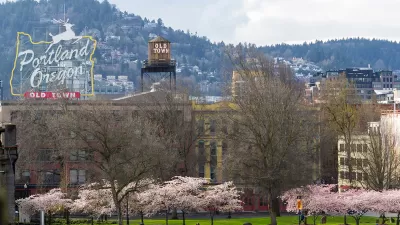The city of Portland, Oregon is considering new regulations to limit the kinds of homes that can be built in existing neighborhoods.
Portland for Everyone writes a post explaining the city's residential infill project, expected to appear before the City Council for consideration at the beginning of November.
The basic idea behind the new residential refill regulations is to reduce the number of 1:1 demolitions in much of the city, which usually turns an older, affordable home into an expensive McMansion. The residential infill project recommends the following changes, all explained in clear detail in the post:
- Greatly reducing the maximum size of new homes.
- Re-legalizing midblock duplexes, corner triplexes, and multiple accessory units.
- New rules about building height and distance from the street.
- Create more tree-lined streets.
- Preserve more on-street parking space.
The post also notes the limitations in how much the ordinance can accomplish, including how many demolitions are likely to be prevented and how affordable new units will be under the new regulations.
FULL STORY: The ‘residential infill project’: Portland’s anti-McMansion recipe

Maui's Vacation Rental Debate Turns Ugly
Verbal attacks, misinformation campaigns and fistfights plague a high-stakes debate to convert thousands of vacation rentals into long-term housing.

Planetizen Federal Action Tracker
A weekly monitor of how Trump’s orders and actions are impacting planners and planning in America.

San Francisco Suspends Traffic Calming Amidst Record Deaths
Citing “a challenging fiscal landscape,” the city will cease the program on the heels of 42 traffic deaths, including 24 pedestrians.

Defunct Pittsburgh Power Plant to Become Residential Tower
A decommissioned steam heat plant will be redeveloped into almost 100 affordable housing units.

Trump Prompts Restructuring of Transportation Research Board in “Unprecedented Overreach”
The TRB has eliminated more than half of its committees including those focused on climate, equity, and cities.

Amtrak Rolls Out New Orleans to Alabama “Mardi Gras” Train
The new service will operate morning and evening departures between Mobile and New Orleans.
Urban Design for Planners 1: Software Tools
This six-course series explores essential urban design concepts using open source software and equips planners with the tools they need to participate fully in the urban design process.
Planning for Universal Design
Learn the tools for implementing Universal Design in planning regulations.
Heyer Gruel & Associates PA
JM Goldson LLC
Custer County Colorado
City of Camden Redevelopment Agency
City of Astoria
Transportation Research & Education Center (TREC) at Portland State University
Jefferson Parish Government
Camden Redevelopment Agency
City of Claremont





























